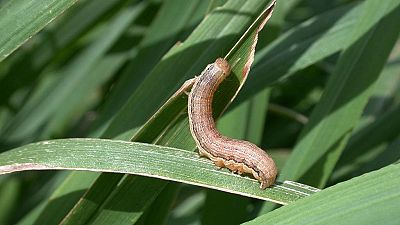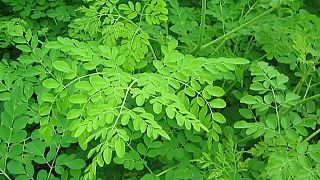Malawi
Farmers in Malawi are using home-made remedies to control armyworms after exhausting pesticide options on the market meant to combat the crop-munching pests.
Army worms attacked farms last year infecting at least half of the country’s maize fields.
Jessy and James Kanjala live in Mulanje district, about 60 kilometres east of the commercial capital, Blantyre.
The couple say they have been able to repel armyworms that invaded their three-acre farm with a solution of water, pounded chilli pepper and salt.
The Kanjalas have been pouring the repellent on crops for about a year now.
“With this local concoction the fall armyworms are dying instantly. As such, if all the farming families were to adopt this local pesticide, we can rescue the remaining crop in the field and in doing so farmers would have some harvest,” said James.
“Three quarters of the maize crop has been destroyed. As farmers we realized quite late that the worms had become resistant to scientifically proven pesticides. But those of us that have applied this locally-made concoction have managed to save our crop. Maybe if we had discovered this method earlier much more of the crop would have been saved,” said Jessy.
The fall army worm infestation erupted across Africa in 2017 including Zambia, Zimbabwe, South Africa following a crippling El-Nino triggered drought which scorched much of the region in 2016.
In Zambia, the government deployed the country’s military to spray pesticides on fields of maize as part of campaigns against the pest.
Armyworms burrow into the plant and are often only spotted when they come out after the damage has already been done.
Scientists say this helps them easily build resistance to chemical control because contact with the chemical is often difficult.
An ongoing dry spell in Malawi has also been exacerbated by the crop-munching fall armyworms, prompting President Peter Mutharika to call on government officials to lead prayers for rain.
He declared the armyworms a national disaster in December after it was discovered that they had spread to 20 of Malawi’s 28 districts.
The government has rolled out pesticides, installed pheromone traps and intensified training and awareness campaigns but the worms are still affecting crops including maize, sorghum and millet.
Samson Muhoye, another farmer in Mulanje has found another remedy. He uses a detergent and salt solution to repel the worms.
Muhoye says the solution is proving to be very effective.
“When this pest affected my crop last year I had no idea which pesticide would be effective. I lost almost all my crop. This year I have saved a lot of it and I think if Malawians adopt this method, surely, they will harvest something,” he said.
Official estimates of the damage to maize by both the drought and armyworms are underway, government and farmer organisations have said.
In the meantime the department of agriculture says the armyworm infestation had spread from an initial 35,000 hectares to 206,000 hectares of maize.
Godfrey Kayira, is a crops Officer, at the Ministry Of Agriculture.
“We do not have anywhere written to say these are technologies which can be used to control fall armyworms. But if they are working, farmers can still use them because they are able to control that pest. But as for the government there is nowhere where it was written that these technologies can be used to control fall armyworms,” he said.
Malawi is periodically hit by food shortages as the tropical southern African country relies heavily on rain-fed agriculture and most of its maize is grown on small plots by subsistence farmers.
REUTERS














01:56
Ivory Coast: Women cooperative for vegetables transforming rural village
02:05
Zimbabwe: El Nino-linked drought threatens maize production
01:13
Ivory Coast to increase official farmgate cocoa price
02:10
Severe drought and famine in southern Africa leaves some 20 million facing hunger
02:30
Somalia: Greenhouse farming to combat food insecurity
01:30
In Senegal, Mariam Sonko is championing women's rights and agricultural Sustainability